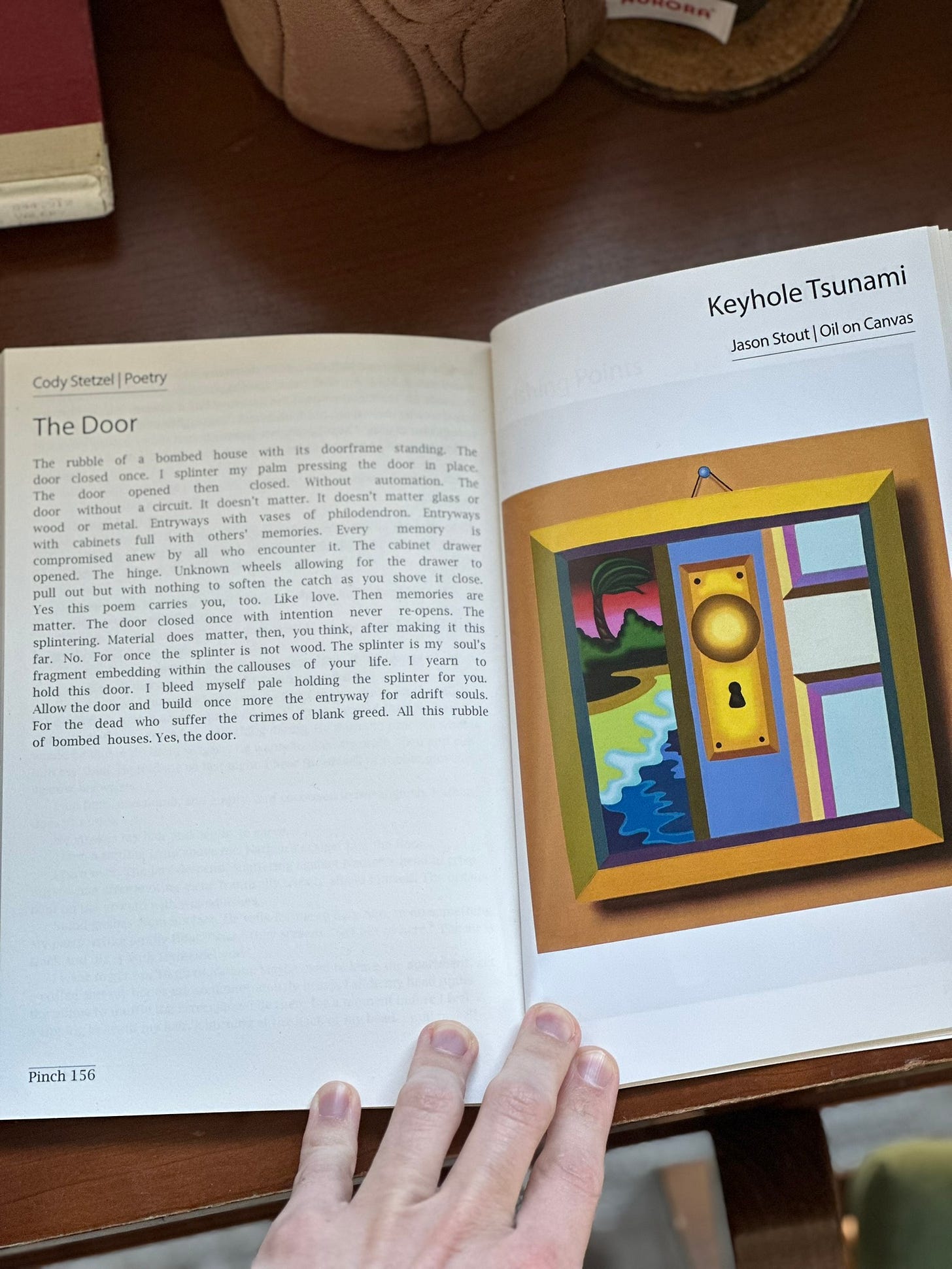Before beginning, you can find my poem available in print at The Pinch’s website here.
Below, you’ll read the first draft of my poem “The door” which has been published in The Pinch today (April 11th!). In admittedly a more vulnerable discussion than I anticipated, I wanted to offer something of a revision process for you.
I rarely talk about revision though it’s something I do perennially. The way I draft poems are such that, mentally, I attribute them to groupings or pilings. Some of these piles might be book projects, or some might just be a loose themed that they’re all speaking to.
As an aside, in recent discussions on my poetry readings, I believe I’ve mentioned how it feels as though some poets write hundreds or thousands of iterations of, effectively, the same poem that they’re trying to convey. And these iterations are successful, useful even. I think of Carl Philips like this in a particularly affective way — I could risk a ‘definition’ of his work that reduces the lyricism by saying so many of his poems are after effectively the same subject; however, poetry is not defined by its subject.
But in this way of creating a taxonomy for my poems, this is how I begin the revision process. By addressing the groups, I find intuitive reasoning for if the poems are necessary individually or if each poem seems to be a different version of one subject I’m after.
“The door,” is very much an individual poem. Below you can read the first draft of it.
Lucky and grateful enough to have Rita Mookerjee give feedback on and edit the manuscript this poem belongs to. She had a comment on this poem which was, “This piece is missing the gravitas that I see throughout the rest of your poems. Give us the “so what?””
One of the first things I did was changing the primary article of the poem from ‘A’ to ‘The’ — from the title through the poem, using ‘a’ was just not allowing the nonspecificity of the nouns to carry any weight. I needed to start the poem with the image of rubble because truly this poem came to me in an amalgam of images: walking down the street to see the skeleton of buildings in-process of being torn down, newspaper images of Gaza being bombed, refusing ICE agents from entering a premise without a warrant by barring the door, and the idea of what a door represents — what being able to open or shut an entrance means in the broader scheme of things.
I needed to introduce the idea of splinters sooner in the poem to help earn the metaphysical volta of splintering in the end. I change the lyric ‘Defined spaces,’ to ‘Entryways with vases of philodendron,’ because it didn’t make sense in my head to make the reader do so much work in imagining the defined space when I had a definition in mind to set the environment.
The only commas I wanted to use were the pull-out moment, acknowledging the reader’s thinking and feeling alongside the poem.
And then the new ending came about from a fixation on repetition. Bringing back the ‘Yes—' phrase structure. The consonance shift from Allow to adrift to all this. Leads me to the printed publication.

I’m not sure I believe in ‘final drafts,’ of anything poetic, really. So, I don’t believe this poem is finished. Even in typing up my thoughts on this process, I was thinking of edits I might try to see how it shifts the sonic landscape of the poem. But I am happy with where it’s landed, and immensely happy with its publication within Pinch.
Let me know if this type of thinking is interesting, or if it comes off egotistical, hah. I feel oddly vulnerable about discussing the work so much, but don’t think there’s any real shame in admitting that, god forbid, I think about my writing.




'I bleed myself pale.'
Such a powerful image!
When I used to write poems, my first drafts were even messier than yours—full of random thoughts.
Only after several rearrangements would they take a form that felt understandable to others.
Your poem holds so much weight.
When I read that you revised it so the reader would understand what you meant, I instantly thought about the Death of the Author theory.